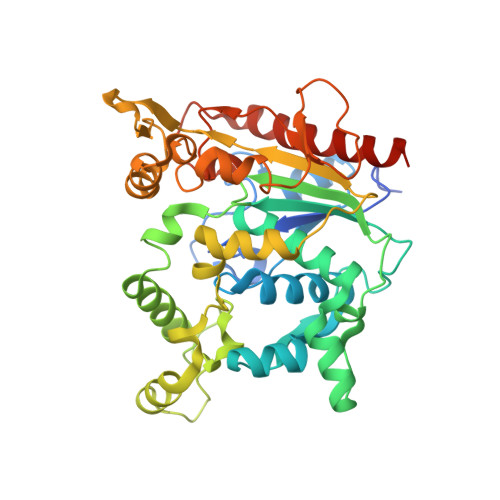Crystal structure of Staphylococcus aureus lipase complex with unsaturated petroselinic acid.
Kitadokoro, J., Kamitani, S., Okuno, Y., Hikima, T., Yamamoto, M., Hirokawa, T., Kitadokoro, K.(2024) FEBS Open Bio 14: 942-954
- PubMed: 38757397
- DOI: https://doi.org/10.1002/2211-5463.13808
- Primary Citation of Related Structures:
8K7P, 8K7Q, 8YIB - PubMed Abstract:
Staphylococcus aureus produces large amounts of toxins and virulence factors. In patients with underlying diseases or compromised immune systems, this bacterium can lead to severe infections and potentially death. In this study, the crystal structure of the complex of S. aureus lipase (SAL), which is involved in the growth of this bacterium, with petroselinic acid (PSA), an inhibitor of unsaturated fatty acids, was determined by X-ray crystallography. Recently, PSA was shown to inhibit S. aureus biofilm formation and the enzymatic activity of SAL. To further characterize the inhibitory mechanism, we determined the half-inhibitory concentration of SAL by PSA and the crystal structure of the complex. The IC 50 of the inhibitory effect of PSA on SAL was 3.4 μm. SAL and PSA inhibitors were co-crystallized, and diffraction data sets were collected to 2.19 Å resolution at SPring-8 to determine the crystal structure and elucidate the detailed structural interactions. The results show that the fatty acid moiety of PSA is tightly bound to a hydrophobic pocket extending in two directions around the catalytic residue Ser116. Ser116 was also covalently bonded to the carbon of the unsaturated fatty acid moiety, and an oxyanion hole in SAL stabilized the electrons of the double bond. The difference in inhibitory activity between PSA and ester compounds revealed a structure-activity relationship between SAL and PSA. Additional research is required to further characterize the clinical potential of PSA.
- Faculty of Molecular Chemistry and Engineering, Graduate School of Science and Technology, Kyoto Institute of Technology, Japan.
Organizational Affiliation:





























